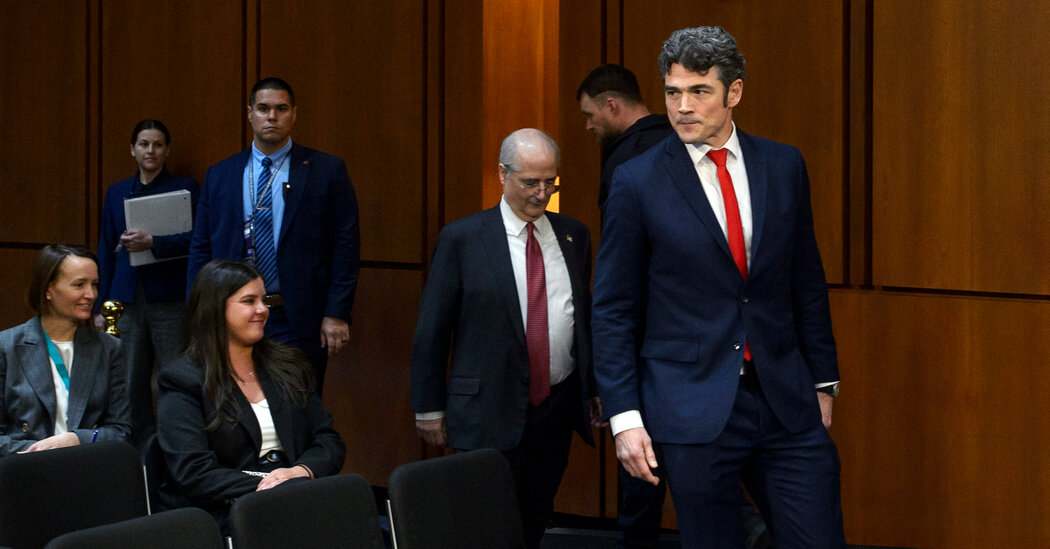France’s foreign minister described himself as “angry and bitter.” He called what President Biden had done “brutal.”
But those harsh adjectives (in their English translation) meant nothing next to something else that the diplomat, Jean-Yves Le Drian, uttered late last week. He said that Biden’s decision to negotiate a secret submarine deal with Australia that nullified a lucrative French arrangement reminded him “a lot of what Mr. Trump used to do.”
And nothing about Biden is ever supposed to remind anyone of Donald Trump.
That was the promise. That was the point. I admire a great deal about Biden, but let’s be honest: He was elected president primarily because he held himself up as the antithesis of, and antidote for, Trump. Implicitly and explicitly, he pledged to answer Trump’s ignorance with experience, Trump’s clumsiness with dexterity, Trump’s callousness with caring, Trump’s dishonor with integrity.
I’d wager that most of the Americans who voted excitedly for Biden were voting even more excitedly against Trump. And that cast its own unique shadow over — and created a special set of burdens for — Biden’s presidency. While many fresh occupants of the Oval Office are supposed to light a few scented candles and rid the Resolute Desk of the prior occupant’s stench, Biden was supposed to perform an exorcism. Never was the devil to be discernible in anything he did.
But he pulled out of Afghanistan without the degree of consultation, coordination and competence that allies expected, at least of any American president not named Trump.
Moreover, his actions — or rather, inaction — regarding the Afghans left behind lacked the empathy that supposedly overflowed in him. That didn’t make him Trump. But it didn’t make him the unTrump, either. As David Sanger wrote in The Times, some allies are “publicly accusing him of perpetuating elements of former President Donald J. Trump’s ‘America First’ approach, though wrapped in far more inclusive language.”
And Biden’s return of hundreds of desperate Haitian migrants to Haiti — even though many no longer have any ties there, because they fled Haiti for South America years ago — also seems Trumpy to many observers. The intensity of some Democrats’ anger about it goes beyond the substance of what’s happening to the symbolism of it. Biden isn’t drawing an emphatic enough contrast with Trump.
As Sean Sullivan and Nick Miroff wrote in The Washington Post this week, White House officials have been struggling “to explain searing images of border agents treating Haitian migrants harshly” and now confront intensifying fury from immigrant-rights advocates who “have increasingly concluded that Biden has failed to live up to his campaign vows to defend vulnerable foreigners seeking a better life in the United States.” The kind of border bedlam attributed to Trump’s incompetence and insensitivity has returned and once again dominates the news.
By the time Biden stepped to the podium at the United Nations on Tuesday to deliver his first speech to the General Assembly as president, the question wasn’t how well he’d do in terms of his own past, present and potential. It was how wholly unTrumpy a figure he’d cut. His previous proclamation that “America is back” was understood to be code for “Trump is gone.” Now he had to prove that the exorcism had taken.
But here’s the thing about Trump’s possession of America: It was made possible by untended sentiments among many voters that haven’t evaporated, on predispositions that endure. And Biden and his advisers know it.
They know the political danger of anything that smacks of an open-border policy, of a moral generosity toward newcomers that can be perceived or spun as a dereliction of duty to longtimers. They know the peril of positioning America as the world’s savior, which can look to some voters like a surrender of national interest — and a sacrifice of American service members — to some highfalutin ideal.
They have surely calculated that French outrage isn’t a serious political liability, not if that emotion arises from the United States having claimed its own payday. They no doubt divine ample electoral rationale for some America First maneuvering without the accompanying America First chest thumping.
And French tempers may already be cooling, if an apparently calm conversation between Biden and President Emmanuel Macron of France on Wednesday is any indication. Perhaps that’s because Biden tends to throw water on fires, whereas Trump preferred gasoline.
All in all, Biden is a far cry from Trump. Hallelujah. But that doesn’t mean that he’s untouched by Trump. And it doesn’t mean that he won’t find himself in similar places, because he’s navigating some of the same dynamics.
For the Love of Sentences
“It was the longest day of the year, and the Irish Sea had a metallic tint. The waves were tiny but insistent, like uncooperative children.” That’s a passage from D.T. Max’s recent profile of the writer Colm Toibin in The New Yorker. (Thanks to Irma Wolfson of Irvine, Calif., for nominating it.)
Toibin’s new novel, “The Magician,” about the writer Thomas Mann, was reviewed recently in The Times by Jay Parini, who had this to say about the book’s protagonist: “What he dreamed about, mostly, was handsome young men. To say Mann was closeted is an understatement. His homoeroticism had many mansions, and he roamed their corridors in his dreams with impunity.” (Nancy Trout, West Hartford, Conn.)
Here’s Jason Gay, in The Wall Street Journal, on the Russian tennis champion Daniil Medvedev: “A 6-foot-6 collection of arms, legs and wondrously unorthodox strokes, Medvedev swinging away on the baseline can look like someone at a picnic batting away flies.” (Jane Jones, Winchester, Mass.)
In The Boston Globe, Scot Lehigh checked in on the efforts of Mike Lindell, the My Pillow founder and Donald Trump comforter, to sell Trump’s corrupt-election lie and noted that Lindell “made himself a laughingstock by hosting a three-day symposium that even his own experts conceded established exactly nothing. Nothing, that is, beyond this axiom: You can take a pillow of impressionable foam from beneath a nutty noggin, but you can’t remove the fluffy foam from inside a pixilated pitchman’s kooky cranium.” (Len Coppola, Gilford, N.H.)
George Will, in The Washington Post, is a reliable lode of glittering prose, such as this: “New technologies — cable television, the internet, social media — produce a blitzkrieg of words, written and spoken. The spoken words are often shouted by overheated individuals who evidently believe that the lungs are the seat of wisdom.” (Stella Deacon, Toronto)
In The Times, Binyamin Applebaum summed up a certain subset of capitalists this way: “For now, the people using Bitcoin are basically a bunch of cosplay libertarians participating in a game of make-believe on the playgrounds of the nanny state.” (Bruce Falstein, Santa Barbara, Calif., among others.)
Bret Stephens wrote: “It’s no accident that Trump’s favorite outlet was Twitter: The medium is perfect for people who think in spasms, speak in grunts, emote with insults and salute with hashtags.” (Susan Preston, Chapel Hill, N.C., and Vicki Shaw, Spring Grove, Pa., among others.)
Maureen Dowd perfectly pegged Elizabeth Holmes, of Theranos infamy: “She really put the con in Silicon Valley.” (Sander Zulauf, Andover, N.J.)
And Margaret Renkl gave thanks for the migration of songbirds: “By the tens of thousands, they pass above us, heading south. Their chittering cheers me, each voice belonging to a hollow-boned miracle of flight.” (John Sparkman, Doyle, Tenn.)
To nominate favorite bits of writing from The Times or other publications to be mentioned in “For the Love of Sentences,” please email me here, and please include your name and place of residence.
What I’m Reading
-
You’re no doubt aware that Texas’ uncivilized new abortion law — which encourages a kind of vigilantism, as I wrote in this newsletter two weeks ago — is being tested by a San Antonio doctor who, in purposeful defiance of it, provided an abortion. But if you haven’t read his account of that, in The Washington Post, do. It persuasively explains the importance of a woman’s right to choose.
-
Ben Dolnick, who has written a few terrific essays for The Times, has a newsletter that uses single sentences by significant writers as springboards for wider musings. Those musings can be wise and delightful: “Martin Amis wrote somewhere or other that when he’s reading he makes check marks in the margins beside especially fine sentences, and that for him the dream novel would have unbroken columns of checks up and down every page. The thought of this dream-novel has always made me a bit queasy — like thinking of eating a chocolate chip cookie that is nothing but an oozing slab of melted chocolate, without the spaciousness-granting stretches of plain and necessary dough.”
-
I absolutely love a brisk page-turner, but too many of the popular novels that shoot for that are so bluntly, clumsily or formulaically written that they turn me off. Not “The Last Flight,” by Julie Clark, which was published last year but which I just read in two big gulps last weekend. Sarah Lyall, reviewing it in The Times, rightly called it “thoroughly absorbing — not only because of its tantalizing plot and deft pacing, but also because of its unexpected poignancy.” Don’t familiarize yourself with it any further; let yourself be surprised.
On a Personal Note
When a song is new, catchy and trendy, I’m used to hearing it, whether I want to or not, every few hours. “Umbrella,” for example. In the summer of 2007, I couldn’t escape it. I spent more time with Rihanna than with my closest friends.
And when a song is an outsize classic, it can, on a given day, come at you more than once, even though its moment is decades past. Led Zeppelin’s “Stairway to Heaven” does that. Queen’s “Bohemian Rhapsody.”
But what to make of my recent experience with “Fade Into You,” by the band Mazzy Star, from the early 1990s? I heard it at least a dozen times last week and just as often the week before. It’s more than a quarter-century old. It’s hardly “Stairway to Heaven.” But it hangs on. It creeps in. It’s the most stubborn song I know.
If you’re not familiar with it, you can catch up this way. It’s singular, not for its melody but for its mood, which Rolling Stone magazine, ranking “Fade Into You” as the 468th best song of all time, described as “spaced out” and “perhaps dream pop’s ultimate statement of blurry desire.” “Fade Into You” has a lulling, hypnotic effect: It’s the aural equivalent of a morphine drip. Listening to it is the closest I’ve come to a trance.
(The second closest is listening to Massive Attack’s “Paradise Circus,” which appeared more than a decade later and also showcases Hope Sandoval, who was Mazzy Star’s lead singer. Some vocalists belt or rasp and quicken your pulse. Sandoval’s style is more an exquisite sigh, and it’s deliciously woozy-making.)
“Fade Into You” isn’t in my music library. It’s not on any of the playlists I’ve made. But it pops up on almost all of my Pandora radio stations, no matter how disparate those stations’ seed songs or seed bands are. I play the station seeded by The National and before long, I hear the telltale opening chords of “Fade Into You.” I play my Aquilo station, my Lana Del Rey station, my Bjork station: “Fade Into You,” “Fade Into You,” “Fade Into You.”
Is the universe trying to tell me something? I have gone down the rabbit hole of the spare, enigmatic lyrics of “Fade Into You” and found more muddle than message. Three sample lines: “A stranger’s heart without a home/ You put your hands into your head/ And then its smiles cover your heart.” Mazzy Star has invented an anatomy all their own, and I can’t wrap my brain around it.
But my heart? “Fade Into You” does something good and warm to it. The song follows me because it is, apparently, where the Venn diagram of my various musical affinities overlap. Either it has the most protean, elastic algorithm in popular music or all my algorithms lead there, to this hybrid of dirge and ballad that — like a favorite blanket, meal or walk — consoles and grounds me.
I bet you have a song like that: not your favorite per se, not the one whose musicianship most impresses you, but the one whose core somehow matches yours. The one that feels like home.
And what you should do when it comes around, whether at your bidding or at the universe’s, isn’t wonder why it’s there. Just sing along with it. Fade into it.
Have feedback? If you want to share your thoughts on an item in this week’s newsletter or on the newsletter in general, please email me at bruni-newsletter@nytimes.com.


